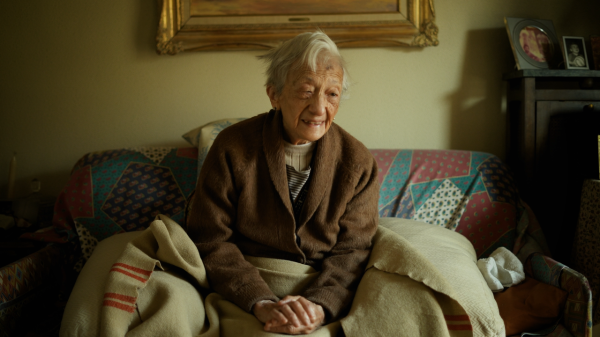
Save this storySave this storySave this storySave this story
The filmmaker David Pisonero Tarantino was asking himself a big question before making his short documentary “Encarnación”: What is the secret to happiness? “I was in a not-so-good place,” he told me, “wondering if I wanted to be a director, how to be a director, how to live off of doing film.” Tarantino was in that impossible place where one’s source of joy and purpose and satisfaction clashes with material constraints. What if, he wondered, his artistic goals were not goals at all but, rather, dreams, designed to eventually be discarded?
That’s when he turned to his great-aunt Encarnación.
As a nonagenarian, blind, retired schoolteacher, Encarnación was happy. It wasn’t a ceaseless euphoria, per se, but she was content, and that in itself was exceptional. It was not the bliss of ignorance—she was bright, always smiling. How was that possible? How could one look at life in such a beautiful way, not just existing to see things through but actually enjoying what life has to offer? How does one become more like Encarnación?
The New Yorker Documentary
View the latest or submit your own film.

The namesake short is the resulting examination. Filmed on Encarnación’s ninety-fifth birthday, with great-aunt as interviewee and nephew as interviewer, the documentary attempts, in a literal way, to witness life the way Encarnación does. “She always told me that all she could see was shadows and blurry images,” Tarantino said. “So I wanted to show that.” With the use of a slow shutter speed, Tarantino’s vision of his great-aunt is stilted, fuzzy. Her words as she talks to her nephew are then scrawled and scratched across the screen, as if she were writing a letter to us, the curious seekers of contentment. “Café con leche, y azúcar en el café,” she quietly chants throughout the short—like a prayer, or, perhaps, like an answer to a prayer—describing a beloved ritual. This isn’t an homage to Encarnación; rather, it’s an embodiment.
A fleet of photographs flashes onto the screen, offering rare moments of visual clarity. The picture sharpens, too, when Tarantino meditates on the domestic doodads that Encarnación has accumulated in nearly a hundred years of living: a small bed squeezed between a wall and an armchair, amber from the glow of a lamp; a vase full of pastel fabric flowers; a plaque, dedicated to “Encarnita,” from her former students that reads “ERES REGAÑONA, PERO NOSOTRAS . . . TE QUEREMOS MUCHO!!”
Tarantino still doesn’t quite know how filmmaking will figure into his life. Encarnación’s life suggests a possibility: that the question of professional aspirations could be different from the question of happiness. “I needed to find a way to understand how to enjoy the ride,” he told me. “And I think she explained it perfectly.” For Encarnación, life is about having a sense of play. You are the one who gets to decide whether you’re happy or not. That decision may look like taking time for small pleasures—say, savoring a good cup of coffee instead of merely getting caffeinated. Café con leche, y azúcar en el café.
Initially, Tarantino said, “this was a film for myself, to remind myself how to be happier in life, but I’m so happy to see that it became so much more. This way, Encarnación can help another person who’s going through a tough time.” He then added, “I know that she will love that.”
Sourse: newyorker.com






